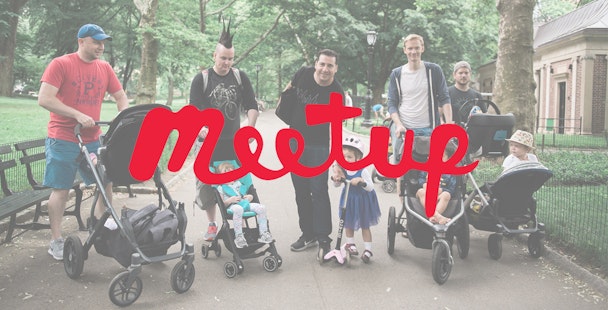Untied from WeWork, Meetup readies for a post-coronavirus marketing blitz
IRL social platform Meetup has divested from WeWork and moved its entire offering to the digital realm in the space of a month. But its chief executive is already thinking ahead to the next phase: a time when Covid-19 fades away, events are permitted, and the brand can take a lead in the world's “social recovery”.

Meetup facilitates IRL group events for communities such as NYC Dads
Meetup had been in WeWork’s clearance sale for a while. Once Adam Neumann’s capitalist kibbutz had jackknifed on its way to going public last September, the name of the game became divesting any businesses uncoupled to the central subleasing offer.
WeGrow – its school – was closed alongside restaurant coworking unit Spacious. Conductor, the SEO and content marketing agency acquired by WeWork in 2018, bought itself back from its parent less than two years later.
Yet Meetup, which was bought by the workspace giant for a reported $156m in 2017, was left on the table. That’s largely because chief executive David Siegel is hyper protective of the 18-year-old company.
“We're the most-known of any of [The We Company] brands by far and there was just a tremendous amount of interest,” he says. “Because of that, it took longer for the whole process to unfold. We met with like 30 different potential buyers.
“There were a bunch of private equity and venture capital firms that didn't necessarily have strong tech backgrounds, and I really wanted someone who knew tech. And I wanted someone that understood the importance of fostering community and human connections – everything that Meetup stands for.”
He toyed with replicating Conductor’s management buyout, but eventually decided against it under the advice of his longtime mentor, Kevin Ryan. And then, like a twist in an investment romance, the entrepreneur presented his own fund, Alleycorp, as a lead buyer.
The deal was announced yesterday (30 March). A group of investors led by Alleycorp purchased Meetup for an undisclosed amount, although Fortune reported it was a "fraction" of the 2017 price.
Digital pivots for a pandemic
Ryan’s interest first grew serious when he saw how Meetup handled the repercussions of the coronavirus, Siegel says.
The pandemic had the power to topple the brand entirely; after all, Meetup's raison d'être is balanced on the idea that people want to meet up and socialize in real life.
But Meetup pivoted quickly. Siegel began encouraging online Meetups on 6 March – 10 days before New York’s bars and restaurants were ordered to close – and the company began rolling out product updates and webinars to make the transition to virtual easier thereafter.
Siegel says more than 10,000 Meetups have now taken place online, primarily over Zoom.
“A friend of mine was just part of a JavaScript Meetup and there were people from 12 different countries that participated in that,” Siegel says. “That's kind of cool.
“We only really allowed [online connections] in one-off cases in the past. It was fairly frowned upon for a long time. But it was something we always wanted to do – we just couldn't really figure out the right way to do it without really hurting our brand.”
Now that Meetup understands how its communities are adapting to online events, the platform has decided to make them a permanent fixture. IRL meetings will still take priority, but online and hybrid (a mix of virtual and real life) events will be offered to organizers too.
This will open the platform up to both a wider user and corporate base. Meetup Pro – the company’s B2B arm – has now worked with more than 1,500 clients, including Adobe, Google and Microsoft. An online offering will allow these brands to reach more prospects internationally and gather more data through Meetup's analytics dashboard.
Post-Covid comms
But the company’s immediate priority is readying itself for the moment everyone is waiting for: when coronavirus infections dissipate, and in-person socialization resumes.
Siegel believes Meetup has the ability to lead “social and community recovery” across the 2,000 cities it currently operates in, and is already preparing communications and outreach plans for the cities that are already sliding back down the Covid-19 curve.
“Now's not the right time to market Meetup, but in a month, two months or three months – in specific geographies – I think we can focus more on brand marketing,” he explains.
“As we get closer to the curve ramping down, there’s an opportunity for us to actually ramp up marketing. And in cities where the governments are starting to allow for events again, we're going to be reaching out to organizers and saying, ‘You can be leaders in your community’."
It’s undeniable that people will want to meet up once the crisis is over. It’s harder to predict whether the sold, resold and formerly beleaguered Meetup will manage to own this inevitable wave of social revelry.

